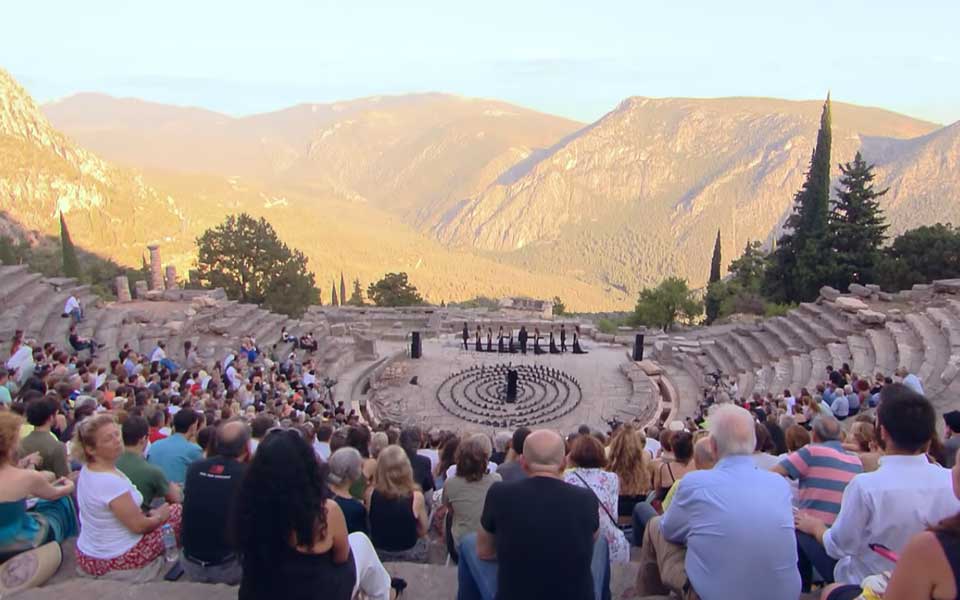This performance of “The Trojan Women,” which took place in the summer of 2018 at the ancient theater of Delphi, is now available to view online. You may not be seated on the ancient stone seats of the historic theater, but the experience nevertheless transports you; the first thing you hear when you press “play” is the chirping of the cicadas.
A spiral made of army boots at the center of the stage is the only set design chosen by director Theodoros Terzopoulos in presenting Euripides’ tragedy, although there is quite an impressive backdrop as well; the Delphi valley stretches out behind the performance area, bathed in early evening light.
This production marked the inauguration of the partially restored Ancient Theater of Delphi after nearly four years of work, while the staging of this play was part of a four-day tribute to Terzopoulos titled “The Return of Dionysus”.
In 1927, this same ancient theater, located within the grounds of the sanctuary of Apollo and the famed Delphic Oracle, saw its first performance in 2000 years (of an ancient Greek tragedy, naturally) at the newly launched Delphic Festival, an enterprise organized by Greek poet Angelos Sikelianos and his wife Eva Palmer.
Years later, Terzopoulos took up the torch by bringing his own vision to the Delphi initiatives; he was the artistic director of the International Meetings on Ancient Drama from 1985 to 1988, during which time he invited eminent figures from international theater, including his former teacher Heiner Müller as well as Marianne McDonald, Robert Wilson, Andrei Serban, Yuri Lyubimov and Anatoly Vasiliev, to present work.

© Johanna Weber


It was at Delphi in 1985 that Terzopoulos created his theater company, Attis Theatre, and where he began developing his own acting method, which is now taught in drama academies and classical departments at universities around the world.
As for the production, this masterpiece by Euripides is a protest against the horrors of war, and Terzopoulos puts forward the need for reconciliation between nations by directing a multicultural group of 11 actors from Greece, Syria, and ethnically divided cities (Nicosia, Mostar and Jerusalem).
The play’s energy comes in large part from the director’s working method, which he has been applying for over 30 years, and in which body language takes on as much importance as speech. Terzopoulos has been a pioneer in physical theater and the most prominent Greek director to use the body as a means of expression and an extension of the mind.

© Johanna Weber
This does not mean that words are ignored: his “The Trojan Women” includes the ravings of not one but five infuriated Cassandras, each speaking in a different language – Hebrew, Arabic, Turkish, Bosnian and Greek. The scene may seem difficult to spectators, yet it constitutes a fascinating example of the anxiety that is born from war. The play’s emotional impact is heightened through quick but intense shifts in mood; the joy of dance turns into cries of sorrow, and tragic monologues are succeeded by humorous scenes.
The primary tragic figure is Hecuba, mother of slain Hector and wife of Priam, king of Troy; the dethroned queen finds herself in the ravaged city of Troy and hears of the sufferings that await Trojan women, who are to be taken as slaves by the Greeks. Her grandson Astyanax will not escape the cruelty of the conquerors either, as he will be thrown from the walls of the city.
Her grief is heartbreaking because it is silent. Her body wanders across the stage and her eye meets the void in the majestic valley of Delphi, whose grayish-green evening colors help to create a naturally tragic setting. “A day will come…” is the play’s last sentence, which aims at awakening the spectator’s conscience with a resounding exhortation that the time has come to bring an end to the ravages of war.












